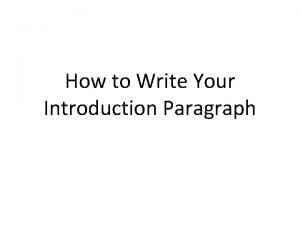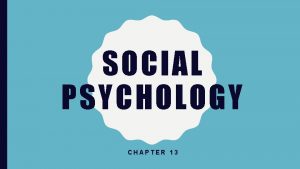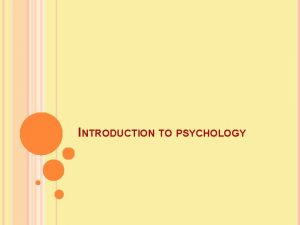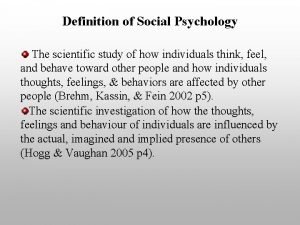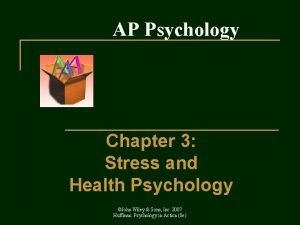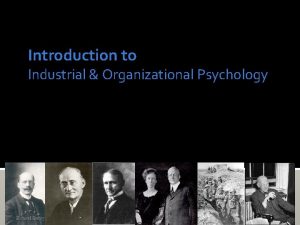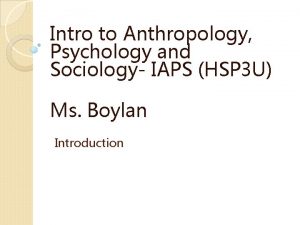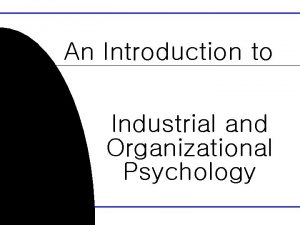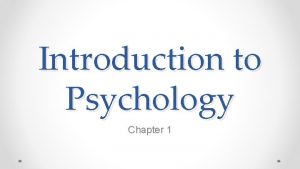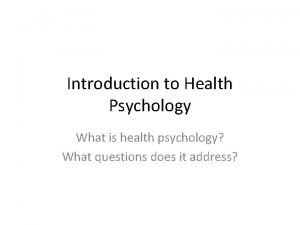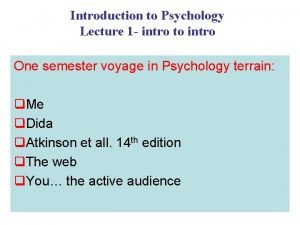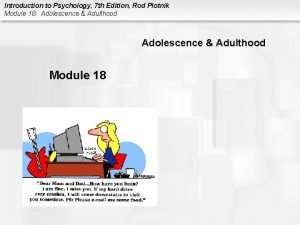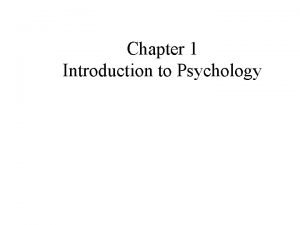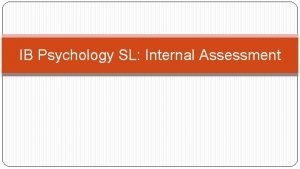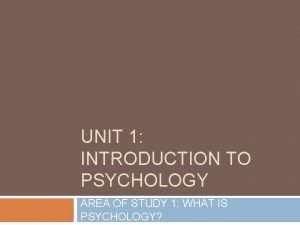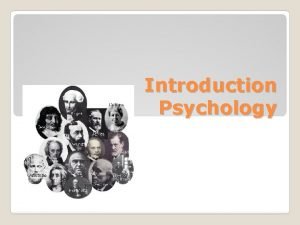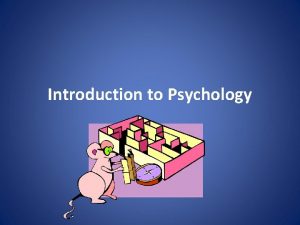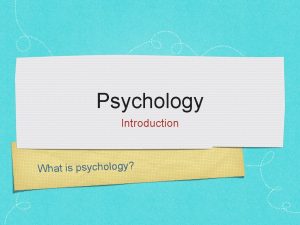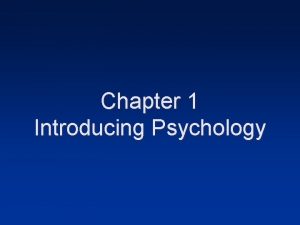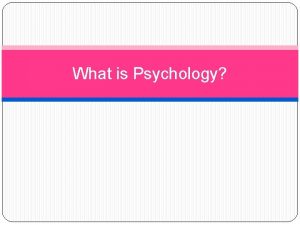Introduction to Psychology Introduction to Psychology To Start



























- Slides: 27

Introduction to Psychology

Introduction to Psychology To Start: Fact or Fib. . ? Decide whether each of the following statements are true or false.

Introduction to Psychology Fact or Fib. . ? Psychology is the same as Psychiatry?

Introduction to Psychology Fact or Fib. . ? B I F Psychology is the same as Psychiatry? Psychiatry is the study and treatment of mental illness. While psychology does look at mental disorders, it is the study of the mind and behaviour.

Introduction to Psychology Fact or Fib. . ? Psychology is a science?

Introduction to Psychology Fact or Fib. . ? T C A F Psychology is a science? it is the scientific study of the human mind and behaviour!

Introduction to Psychology Fact or Fib. . ? Psychology links well to Sociology?

Introduction to Psychology Fact or Fib. . ? Psychology links well to Sociology? FACT Sociology is the study of humans in society. It requires similar skills in critical thinking and writing.

Introduction to Psychology Fact or Fib. . ? Psychologists can tell what you’re thinking?

Introduction to Psychology Fact or Fib. . ? Psychologists can tell what you’re thinking? FIB Psychologists can only study observable behaviours. They are not psychic!

Introduction to Psychology Fact or Fib. . ? Sigmund Freud is a famous Psychologist?

Introduction to Psychology Fact or Fib. . ? Sigmund Freud is a famous Psychologist? We’ll study Freud’s theories in more detail later in the course!

Introduction to Psychology Fact or Fib. . ? A Psychologist might be interested in how we can improve our memory?

Introduction to Psychology Fact or Fib. . ? A Psychologist might be interested in how we can improve our memory?

So, Psychology can be described as… The study of the human mind, it’s functions and how it affects behaviour.

Today we will… • Introduce some of the approaches in Psychology • Explore how these can be applied to real life situations.

Task: Count how many times the players in white pass the ball… http: //www. youtub e. com/watch? v=v. JG 698 U 2 Mvo

Task: What Gorilla? With the person next to you, discuss and note down ideas on: • Why is it possible to miss the Gorilla? • What could this suggest about our brains? 3 Minutes

Approach 1: Cognitive Psychology Our brains can’t pay attention to more than one thing at a time. This is called selective attention. Our brain can also be fooled by optical illusions. This is called perception. These processes fall into Cognitive Psychology which looks at mental processes and how we think. As part of the GCSE Psychology course, we study memory one part of cognitive psychology.

Task: How many sweets are there? Pass the jar of sweets around the classroom. Write down the answer on your individual white board. Do this on your own! Keep it secret! Hide your answer until everyone has finished.

Task: What did we find? You have one minute to: If you changed your answer, think about and write down why you changed it? What did you base your second answer on? If you didn’t change your answer, think about and write down reasons why other people did change their answers? 1 minute

Approach 2: Social Psychology Changing your behaviour in line with other people or external factors is called Social Influence. This is part of Social Psychology, which looks at how people’s behaviour, thoughts and feelings are influenced by the actual or imagined presence of other people.

Task: Nature Versus Nurture 1) What do we mean by ‘nature versus nurture’? 2) How can this be applied to Psychology? 2 minutes

Approach 3: Biological Approach Nature often refers to our biology. Factors we were born with such as genes, hormones and the structure of our brains. Nurture refers to factors in our environment, how we learn. In psychology this debate can be applied to certain behaviours to try and explain why these behaviours occur.

In GCSE Psychology… We apply all of these approaches to different topics. These include: Personality Stereotyping & Prejudice Sex & Gender Learning Aggression Memory Non Verbal Communication We also have to consider how psychologists conduct and analyse their research. This is known as Research Methods.

Task: Psychology Post It’s 1) A definition of Psychology 2) One thing you have learned about Psychology today. 3) Come and stick it on the brain board! 2 minutes

The Brain Board
 Site:slidetodoc.com
Site:slidetodoc.com Jumpstart algorithm
Jumpstart algorithm Introductory paragraph format
Introductory paragraph format Good introduction paragraph examples
Good introduction paragraph examples How to start your introduction paragraph
How to start your introduction paragraph What is funnel introduction
What is funnel introduction Sample of biography about myself
Sample of biography about myself English for presentation unit 1
English for presentation unit 1 Positive psychology ap psychology definition
Positive psychology ap psychology definition Altruism
Altruism Social psychology ap psychology
Social psychology ap psychology Introspection method
Introspection method Social psychology is the scientific study of:
Social psychology is the scientific study of: Health psychology definition ap psychology
Health psychology definition ap psychology Siop jobnet
Siop jobnet Introduction to anthropology psychology and sociology
Introduction to anthropology psychology and sociology Introduction to industrial psychology
Introduction to industrial psychology Introduction to psychology chapter 1
Introduction to psychology chapter 1 Introduction to health psychology
Introduction to health psychology Introduction to forensic psychology bartol pdf
Introduction to forensic psychology bartol pdf Sociology psychology and anthropology venn diagram
Sociology psychology and anthropology venn diagram Introducción a la psicología psychology: an introduction
Introducción a la psicología psychology: an introduction Introduction to psychology lecture
Introduction to psychology lecture Introduction to psychology rod plotnik
Introduction to psychology rod plotnik What is anthropology
What is anthropology Introduction to psychology chapter 1
Introduction to psychology chapter 1 Psychology ia exploration
Psychology ia exploration Unit 1 introduction to psychology
Unit 1 introduction to psychology


